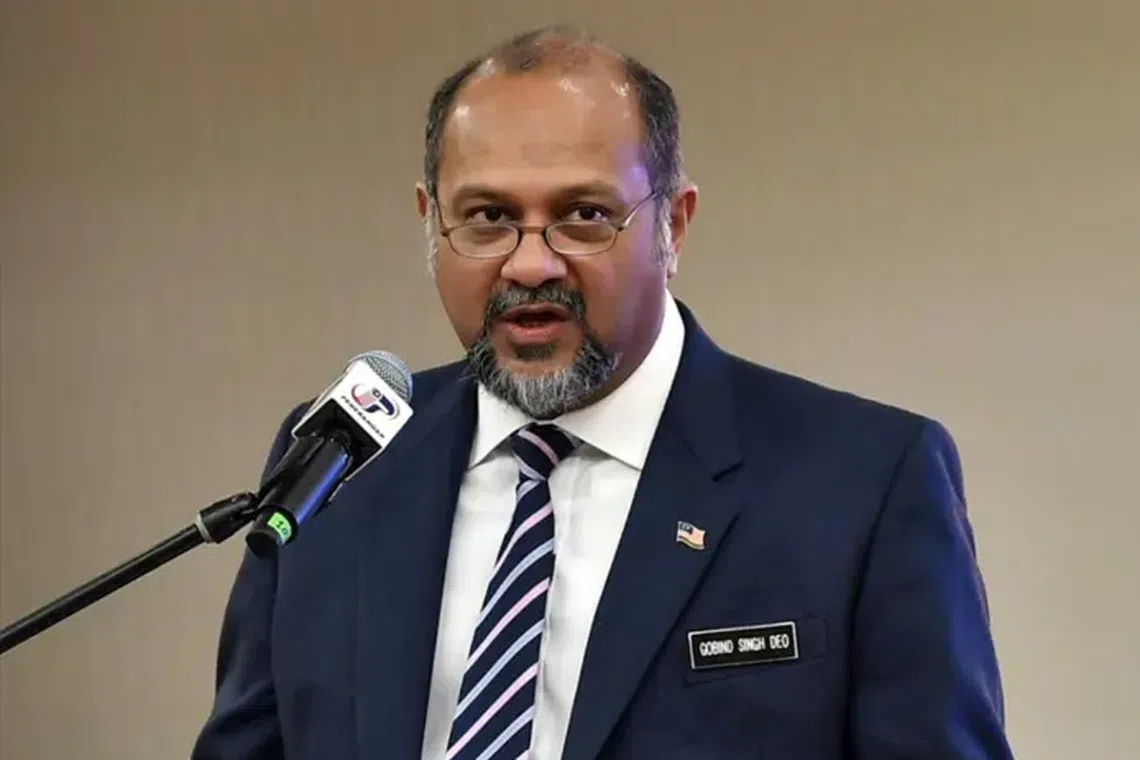Malaysia to toughen laws to crack down on cyber bullying: Digital minister
Sign up now: Get insights on the biggest stories in Malaysia

Malaysian Digital Minister Gobind Singh Deo also supported the move to refine the law on cyber bullying in the country.
PHOTO: THE STAR/ASIA NEWS NETWORK
PETALING JAYA – Malaysia aims to strengthen its cyber bullying laws by requiring social media platforms to assume greater responsibility despite challenges posed by language barriers, said Digital Minister Gobind Singh Deo.
“If you provide a platform, you need to make sure that the necessary tools are available to provide a safe environment (to users),” he told The Star on July 27.
On July 5, social media influencer A. Rajeswary, better known as Esha, was found dead after becoming a victim of extreme cyber bullying
As a result, police investigated two TikTok accounts suspected of using Miss Rajeswary’s image as the background of video content uploaded in them.
Mr Gobind said the regulators should implement tools that create a safe environment for users online regardless of the languages being used. “They should have thought about this (language barrier) before allowing conversations to gather that kind of momentum on their platforms, which resulted in such serious consequences.
“This is not for them to simply apologise and say they do not have the right tools in place for them to understand the language.
“That is something you need to do before you invite people to use your platform, whichever language it may be and subsequently which could lead to a problem,” he said.
The minister, who is a legal practitioner, stressed that the government must at all times demand transparency and accountability from social media platforms whenever such a case happens.
“The regulators must be able to say that right now, while the social media platform exists and conversations continue on it, the problem is being fixed,” he said.
On July 18, Communications Minister Fahmi Fadzil said TikTok has increased the number of moderators to scrutinise content and live sessions in all languages, including Tamil, after the death of Miss Rajeswary.
Mr Gobind also supported the move to refine the law on cyber bullying in the country.
The digital era comes with new challenges such as collecting evidence on online abuse cases, he said.
“I agree with Minister in the Prime Minister’s Department (Law and Institutional Reforms), Datuk Seri Azalina Othman Said, that there is a need for us to specifically define cyber bullying and online abuse in order to tighten the law in these areas.
“This would enable us to make specific provisions to allow evidence to be used to prove a case against a person,” he added.
At an Umno delegates’ meeting on July 28, Deputy Prime Minister Zahid Hamidi said Miss Rajeswary’s recent death is a very sad case as the “existing law does not provide adequate punishment”.
“We do not blame the court, but the law imposes only a low fine,” he was quoted as saying in Bernama, adding that the law should be amended to ensure heavier punishment for cyberbullies.
He also said Malaysia made the right move in requiring social media services with more than eight million users in the country to apply for a licence from Aug 1.
The new requirement, announced on July 27, is needed to address the rise in cybercrime, including the use of fake accounts for bullying, scamming and spreading negative perceptions about the government, he said.
The Umno president added that the Malaysian Communications and Multimedia Commission has the power to shut down social media services which fail to apply for a licence by Jan 1, 2025.
Malaysia reported a sharp increase in harmful social media content earlier in 2024 and urged social media firms, including Facebook parent Meta and short-video platform TikTok, to step up monitoring on their platforms.
Currently, the communications regulator can flag content that contravenes local laws to social media firms, but it was up to the platforms to decide on removing the content. THE STAR/ASIA NEWS NETWORK, REUTERS


